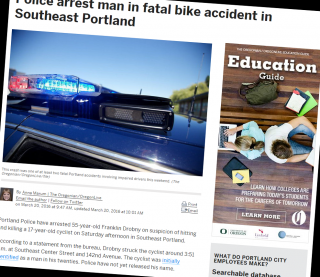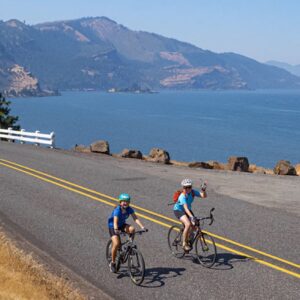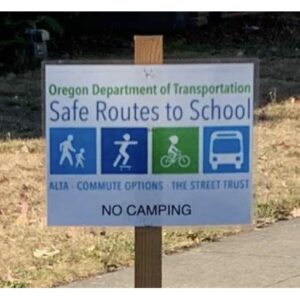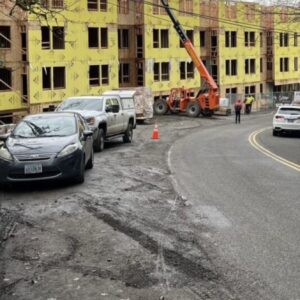I spent five years in daily newspapers. I get it. Everyone has an axe to grind; it is not your job to grind their axes for them.
When you use the word “accident” in a story about a man who allegedly decided to get drunk and zoom down an East Portland side street in a pickup truck, presumably getting a nice bounce over the speed bumps right before he killed a 17-year old on a bicycle, some people get upset.
Use “crash” or “collision,” they plead. Not “accident.”
I got these comments myself sometimes after I’d worked weekend shifts at my last newspaper, The Columbian, and for years I ignored them.
A weekend evening on most of the nation’s daily newspapers is a bloody routine. More Saturday nights than not, you will end up reporting (remotely, without ever visiting the scenes) brief items about one or more of the approximately 577 people who die every week in traffic collisions across the country.
Sometimes you type “collision.” Sometimes you type “accident.” I never had an editor that cared. No wonder; the AP Stylebook implies they’re equivalent.
Of course nobody gets behind a wheel intending to die or kill, I reasoned. Of course these are accidents. By using language acknowledging the plain fact that the deaths were not deliberate, I am avoiding a jump to conclusions. I am being the grownup here.
Advertisement
Then, finally, I landed on an Active Right of Way email thread with a bunch of people who later became my friends. We were discussing a collision in which a man named Antonio Cellestine had been texting while driving and killed a high school teacher.
One person in the conversation, a safety advocate and professional linguist named Alexis Grant, wrote the explanation that set me straight.
The definition of “accident” is “occurs unintentionally”. The final act may be unintentional, but it can still be a serious crime (manslaughter in this case), and one whose genesis was definitely in choices made by the perpetrator. Cellestine was driving on a suspended license and was texting while driving. Intentionally. Those were his choices, even knowing that he was legally forbidden from driving and that texting while driving is not permitted. He decided to break two laws intended to keep the roads safer. He created circumstances in which his likelihood of hurting or killing others or himself was heightened, circumstances he could have chosen not to create. Calling the result an accident minimizes the agency he had in creating it.
Some traffic collisions are actually accidents. Once in a while, someone dies without anyone having made any decision that significantly contributed to the death.
But here’s the thing: A reporter working on a breaking news story about a traffic fatality has no way of knowing whether a particular crash is an accident or not. It’s the same as using “homicide” instead of “murder” or “fight” instead of “attack.” You weren’t there. You just don’t know.
For journalists, the point of avoiding “accident” is not to advance social justice on the streets. The point is to avoid making an inaccurate assumption.
For journalists, the point of avoiding “accident” is not to advance social justice on the streets. That’s an axe for other people to grind.
The point of avoiding “accident” is to do one’s job: to avoid making an inaccurate assumption.
When you are listening to a police scanner in a cubicle late at night, or standing in the rain beside a yellow police ribbon, or interviewing a police sergeant the next day, you simply do not have enough facts to know what choices might have contributed to the collision. You do not know if the collision was purely an accident, and you should not presume that it was.
“Crash” is more accurate. It’s shorter, too. Just write “crash.”
— Michael Andersen, (503) 333-7824 – michael@bikeportland.org
BikePortland can’t survive without subscribers. It’s just $10 per month and you can sign up in a few minutes.








Thanks for reading.
BikePortland has served this community with independent community journalism since 2005. We rely on subscriptions from readers like you to survive. Your financial support is vital in keeping this valuable resource alive and well.
Please subscribe today to strengthen and expand our work.
Also: beware the passive phrasing like “truck kills pedestrian”.
For instance, Jen Dowling of KOIN: “Dodge Dakota kills bicyclist”
I want to say there was something similar during the Sellwood Bridge incident, but I can’t find it.
Yup.
“a young cyclist was hit by a pickup truck in Southeast Portland.”
http://www.oregonlive.com/pacific-northwest-news/index.ssf/2016/03/arrest_fatal_cully_crash.html#incart_river_home
Re the Sellwood bridge, someone at KATU posted a tweet saying that “the truck had wedged itself” into the sidewalk. For real.
https://twitter.com/evanbellKATU/status/704685524733198336
Excellent, Michael. Thank you.
Well said! I’ve ceased using MVA in documentation, now its just a collision. There are few accidents, and many more moments of negligence.
I once read about a crash that appeared to be an accident. A young man had a front wheel come off his pick-up, which caused his vehicle to collide head-on with a car that was carrying two school teachers and their child, resulting in two fatalities.
On further investigation, the person driving the pick-up was aware of the problem with his front wheel and decided to not take care of it. Apparently, the bearings had been worn out for quite a while and eventually wore away the axle, which snapped.
I still think there might be a handful of accidents out there every year, but, like hens’ teeth, they’re mighty rare.
Thanks Michael…I think I wrote one of those notes to you at the Columbian.
I too became aware of this shift in language during an excellent presentation back in 1999 from an transportation department in Florida that made the shift early.
So since you brought it up – how do we go about lobbying the AP to update their stylebook? [Assuming reporters and bloggers know that such a tool exists…and due to the lack of editorial review/ proofreading industrywide anymore given the 24/7 news cycle.]
Todd, there was an effort at the end of last year to encourage AP Stylebook editors to established a cleared, more accurate statement on use of “accident”. They have commented in a past QA that reporters should avoid use of “accident” as it “might suggest a conclusion”. The new Stylebook is due out shortly. We hope that they listened to the feedback and will have some clearer statement.
Brilliant, Michael.
Also, please actively encourage your police agencies to adopt this standard, and if they have but continue not to abide by it (like the SFPD), please let them know.
We should be using murder, not crash, because that’s exactly what’s happening on our streets every day.
mur·der
ˈmərdər/
noun
noun: murder; plural noun: murders
1.
the unlawful premeditated killing of one human being by another.
“the stabbing murder of an off-Broadway producer”
synonyms: killing, homicide, assassination, liquidation, extermination, execution, slaughter, butchery, massacre; More
manslaughter;
literaryslaying
“a brutal murder”
informal
a very difficult or unpleasant task or experience.
“my first job at the steel mill was murder”
synonyms: hell, hell on earth, a nightmare, an ordeal, a trial, misery, torture, agony
“driving there was murder”
verb
verb: murder; 3rd person present: murders; past tense: murdered; past participle: murdered; gerund or present participle: murdering
1.
kill (someone) unlawfully and with premeditation.
“somebody tried to murder Joe”
synonyms: kill, put to death, assassinate, execute, liquidate, eliminate, dispatch, butcher, slaughter, massacre, wipe out; More
If it would create a social bias against drivers, it would be a good idea. There is such a thing as beneficial bigotry.
At least use the word “homicide” more often, especially regarding DUI and electronically distracted driving.
Language matters. A ton. Thanks.
Thanks Michael. I agree with everything you wrote.
But since you took the time to write this let me recommend an excellent book that complicates this issue considerably (at least I think it does). It is written by a sociologist and is an extended exploration of the concept of accident through history. The book is Risk and Misfortune: The Social Construction of Accidents, and is by Judith Green. It is not an easy read but I think you’d find it worth your while.
https://books.google.com/books/about/Risk_and_Misfortune.html?id=c4b5JU8spggC&printsec=frontcover&source=kp_read_button&hl=en#v=onepage&q&f=false
Thanks for the tip, 9watts!
Thank you for this great post. In my mind, when reporters use the word “accident” they are stating unknown information regarding the circumstances of an event. In many cases reporters (Traffic, TV, radio, newspaper) use “accident” as a default for all crashes. They use “accident” before there is any determination of intent, fault or blame. Road rage, murder and vehicular suicide are all intentional events. Drunk, drugged, distracted, high speed, aggressive driving are all intentional behaviors. The resulting crashes from these intentional behaviors are not “accidents”. By defaulting to “accident” reporters editorialize about the actions and mindset of the involved parties. Journalists should report facts, not assumptions.
bottom line ppl were “killed” this past weekend. 🙁
If we are getting into semantics, maybe you could write an article about the different meanings of ‘journalists’, ‘columnists’, ‘editorialists’, and bloggers.
Why don’t you start since you obviously have something in mind?
I think I can do this in one sentence: Columnists, editorialists, reporters, editors and (in some cases) bloggers are all different and occasionally overlapping varieties of journalist.
This is great, Michael. Perhaps the definitive #crashnotaccident post.
I have never heard of a “plane accident”; it’s always plane crash. Maybe because a pilot license means a lot more than a driver license?
Having been to lots of car crashes over the years when I worked as a paramedic, I can’t remember a single one that can really meets the definition of an accident. Speeding, alcohol, and distraction top the list of causes. Somehow the daily carnage on the ground is not as alarming as the much more unlikely prospect of falling out of the sky.
The Oregonian is lagging way behind the times. I stopped using “accident” when I was reporting on CDC injury prevention research over a quarter century ago. The director of the CDC injury division had a jar on his desk to collect a small fine (that went into an office party fund) from any staffer who said “accident”. After all, the whole premise of their research (like NTSB and other groups) is that by understanding the causes, crashes can be prevented.
Here are a few references to other notes on the topic, some going back many years:
http://www.ncbi.nlm.nih.gov/pubmed/12224806
http://usa.streetsblog.org/2013/12/11/its-time-for-the-ap-to-nix-the-term-accident-to-describe-car-collisions/
http://azbikelaw.org/was-that-an-accident-or-a-crash/
Years ago, I thought Hot Fuzz made the point very well with humor.
https://www.youtube.com/watch?v=puK5CwThaq4
I think that there are some politics at play here. The motor vehicle industry, like the firearms industry, wants to downplay the notion that their products are potentially dangerous. When two objects collide, whether it is two cars, a car and a bicycle, a bullet and a person, it is rarely if ever by “accident”. It is most often because one or more actors was negligent. When you are using potentially dangerous objects, cars, trucks, firearms, bicycles, airplanes – you need to develop a culture of safety and use that culture to develop safe habits. I read a news article the other day about a four year old shooting his mother with her handgun, which was on the floor of the back seat of her car – this is not an accident, it is negligent discharge of a firearm occasioned because the owner/operator failed to secure the firearm. Similarly, if I allow myself to become distracted, or speed, or whatever while driving, or weave all over the road when riding my bicycle, I am creating a dangerous situation in which I, or another person, could be injured or killed.
Developing safe habits when operating potentially dangerous equipment will ensure that incidents in which people or animals are injured or killed, or property damaged or destroyed are minimized, hopefully eliminated. Safe habits include respecting the rights of others to go about their business in safety.
I made this word-choice suggestion to my employer’s safety communications department, they said that their wording is specifically chosen to be consistent with terminology dictated by OSHA and ANSI .
https://www.osha.gov/
https://www.ansi.org/
“Accident” isn’t forgiving enough. I’ve been encouraging the Oregonian to use “oopsie daisy” for years.
For example, “Alcohol, Speed to Blame for Fatal I-5 Oopsie Daisy.”
It couldn’t be helped!
I don’t like “crash” because it is a description of a noise. I suppose most traffic collisions result in a crashing noise, but it would be more accurate to stick to “collision.”
“Collision Results In Accidental Murder”
I feel this article misses some of the main points.
We don’t call plane crashes “plane accidents.” And the airline industry treats them seriously. They closely investigate EVERY SINGLE CRASH and make sure the same issues can’t happen twice.
But with cars we just shrug and move along with our lives. Just an accident.
The massive loss of life we have on our roads is connected a lot with street design. Yet most places refuse to design safer streets.
WashCo engineers currently define ‘safer streets’ as ‘wider, with traffic signals and bike lanes’. It’s a flawed definition, IMO, but that’s the way we are building now, under the illusion of safety.